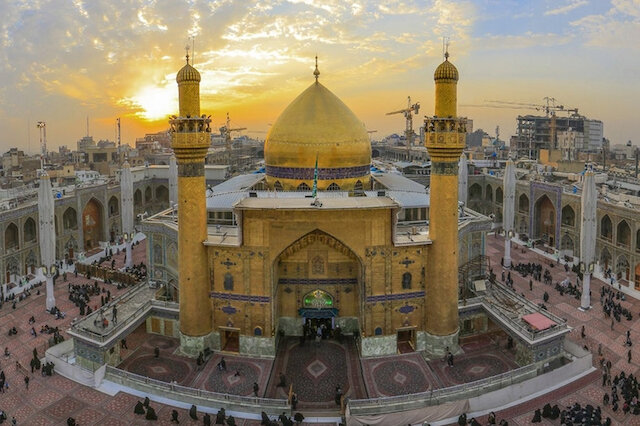Ghadir: A Prescription for Humanity

Ghadir is an indisputable matter in history and Islam
For Muslims, Eid al-Ghadir is “the greatest Eid determined by God, and it is above all other Eids.” (Sept. 20, 2016) The occurrence of this event in Islamic history is “one of the indisputable events and occurrences.” (Aug. 27, 2021) Furthermore, it “is not an event that only the Shia have narrated.” (Sept. 20, 2016) Rather, “Sunni scholars in hadith have narrated this event, both in the past, in between, and in later periods.” (March 25, 2000) This event took place as follows, “During the Farewell Hajj, which took place in the last year of the Prophet’s life and in the tenth year of Hijrah … After returning from Hajj, he gathered everyone at a place between Mecca and Medina referred to as ‘Ghadir Khumm.’” (Sept. 14, 1984)
“The inhabitants of the Arabian Peninsula, many of whom were from the deserts and villages and accustomed to the heat, could not bear to stand on the hot ground there in that hot weather. Thus, they put their abayas [cloaks] under their feet so that they could endure the heat while standing there.” (March 25, 2000) In this difficult situation, the Holy Prophet “stood on an elevated place, raised the [hand of the] Commander of the Faithful, and showed him to the people. In order to prevent any misconceptions, he introduced him and said, ‘For whomsoever I am his master, whoever I have authority over, whoever has accepted my governance, Ali is his master too. Ali ibn Abi Talib – this Ali that I am showing you, is his master.’” (Sept. 14, 1984)
Ghadir is a criterion and a measure
It should be noted that “the issue of Ghadir is not merely a historical matter.” (Jan. 8, 2007) Rather, it is “an indication of the comprehensive nature of Islam and its vision for the future.” (Jan. 8, 2007) In addition, it also shows “the Holy Prophet’s involvement in the matter of managing society.” (Jan. 29, 2005) Therefore, “the importance of the issues of caliphate, wilayat, and Islamic governance prompted the Holy Prophet to inform and enlighten the people about this matter in the final months and weeks of his blessed life.” (Sept. 14, 1984) As a matter of fact, “the appointment of the Commander of the Faithful [Imam Ali (pbuh)] was not solely about appointing spiritual aspects. Rather, it can be said that spiritual aspects are not something that can be appointed. Matters that are subject to appointment include governance, administration of a country, politics, and management of the Islamic society.” (Oct. 13, 2014) Therefore, Islam developed a plan for the guidance of society and “for cleansing the sediments of ignorance from the depths of … society and for keeping the line of Islamic guidance straight [even] ten years after the Prophet’s time.” (Jan. 8, 2007) Islam established a criterion and a measure that “Muslims can place before them throughout time to determine the general direction to be taken by the Ummah.” (Dec. 6, 2009)
Presenting the model of Imamate to humanity
Another key point is that in Ghadir, “Islam presents a model and the method of Imamate to humanity. That is, a person’s heart is filled and overflows with the grace of divine guidance. He/she also knows and understands the teachings of religion – that is, they recognize the right path – and they also possess the power to take action.” (March 3, 2002) Therefore, “the event of Ghadir was not just about appointing a successor for the Prophet. … The other aspect of the matter was drawing attention to the issue of Imamate.” (Nov. 25, 2010) Furthermore, “Imamate is the pinnacle of the meaning of governing society in a desirable fashion in contrast to all kinds of management of society that are founded on human weaknesses, lusts, arrogance, and greed.” (March 3, 2002) Thus, “it became clear that in an Islamic society, there is no place for a monarchy, autocracy, tyranny, aristocracy, an arrogant power ruling over the people, or a government of privilege-seeking, greed, self-aggrandizement, and debauchery . It became clear that this is how it is in Islam. This rule was established in Ghadir.” (Sept. 20, 2016)
Ghadir: A universal issue for all human societies
Another fact about Ghadir is that “the governance of human affairs is a divine matter, not a human one. This sets it apart from all other matters regarding human beings.” (April 26, 1997) Therefore, “the Holy Prophet did not choose the Commander of the Faithful based on his own personal calculations even though any individual would be led to the conclusion that Ali was the logical successor of the Prophet through their own calculations. Rather, the action taken by the Prophet was a divine action.” (Dec. 6, 2009) In fact, “the issue of Ghadir encompasses choosing knowledge, piety, jihad, devoutness, and sacrifice for the sake of God, as well as precedence in faith and Islam. It involves putting importance on these qualities in determining and specifying the management of society.” (11/07/1990) Therefore, “Ghadir in its true meaning is not limited to the Shia alone.” (March 3, 2002) This is because “the matter of Imamate is not a matter exclusive to the Muslims or the Shia.” (Nov. 25, 2010)
Altering the course of human history by adhering to the decree issued in Ghadir
In conclusion, “the duty of the Islamic nation in terms of guidance and governance was determined in the event of Ghadir.” (Dec. 6, 2009) If the Muslims had acted in accordance with this divine, prophetic decree, “without a doubt, the course of human history would have been changed. Today our position would have been far more advanced than what it has been in humankind’s long history.” (Jan. 19, 2006)
| © | KHAMENEI.IR |


